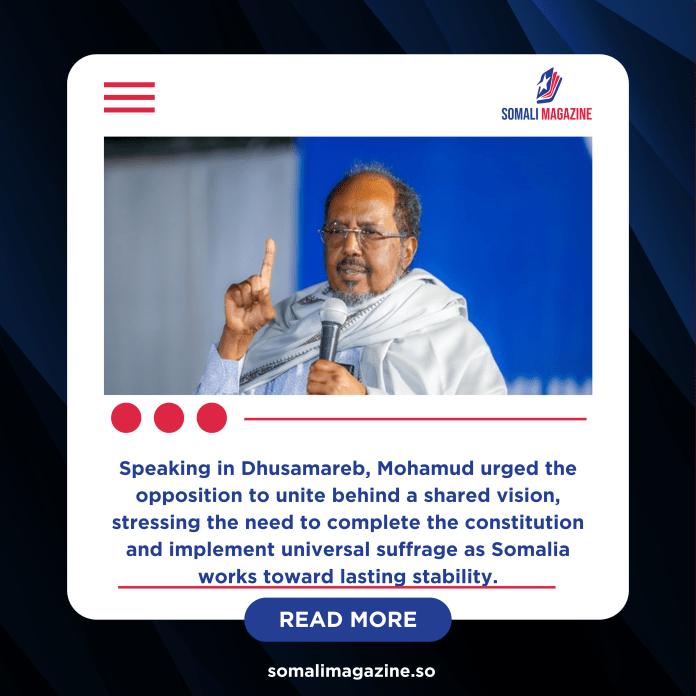Facebook Twitter (X) Instagram Somali Magazine - People's Magazine
Somali President Hassan Sheikh Mohamud has criticized the country’s opposition, accusing it of lacking a shared vision for Somalia’s future and warning that divided politics could stall the nation’s reform agenda.
Speaking on Wednesday in Dhusamareb, the capital of Galmudug state, Mohamud said the current opposition coalition is disorganized and driven by competing interests rather than a collective plan for national development.
“The opposition I was part of in 2022 and the one that exists today are two different things,” the president said. “There is no unifying vision. Everyone is going in a different direction, and that does not lead to progress.”
Opposition Divisions
Mohamud’s comments come at a time when talks between the government and the opposition remain deadlocked. The main opposition bloc, known as the Somali Salvation Forum, has been in discussions with the government for months. However, four rounds of negotiations have failed to produce a breakthrough, highlighting the deep political rifts shaping Somalia’s future.
According to Mohamud, the absence of unity within the opposition has made it harder to reach agreements on vital national priorities. He contrasted the present situation with his own experience as part of an opposition alliance in 2022, which he said was more cohesive and goal-driven.
Reform Commitments
The president reaffirmed his administration’s commitment to two key promises he made during his 2022 campaign: finalizing Somalia’s long-delayed constitution and introducing a one-person, one-vote electoral system.
For decades, Somalia’s elections have relied on a clan-based system in which elders and power brokers play a decisive role in selecting representatives. Mohamud argued that only a universal voting system would give ordinary citizens real power in shaping the government and holding leaders accountable.
“We must overcome the current challenges, such as completing the constitution and returning power to the people,” he said. “Somalia cannot remain stuck in a cycle of uncertainty. It is time to move forward with reforms that benefit the entire nation.”
Call for Party-Based Politics
In his speech, Mohamud urged Somalia to abandon politics centered on individuals and vested interests. Instead, he called for the development of genuine political parties that operate based on clear principles and shared visions.
“Politics that revolve around personalities cannot build a stable future,” he said. “We must build parties that represent values and ideas, not just personal ambitions. That is how we can achieve lasting political and social change.”
He argued that a shift to party-based politics would encourage accountability, foster national unity, and reduce conflicts driven by personal rivalries.
Pushback from Regional States
Despite the president’s assurances, his reform roadmap continues to face resistance from regional states and opposition groups. Puntland and Jubbaland, along with the Somali Salvation Forum, have openly opposed Mogadishu’s approach to elections.
They accuse the federal government of making unilateral decisions without consulting widely enough across the political spectrum. Leaders from these regions argue that a lack of consensus risks deepening Somalia’s political crisis rather than resolving it.
Observers note that the standoff underscores a broader challenge: balancing the federal government’s push for reform with the autonomy and concerns of Somalia’s member states. Without compromise, progress on key reforms may continue to stall.
Looking Ahead
As Somalia works toward completing its constitution and laying the foundation for democratic elections, the tension between Mogadishu and opposition groups is expected to remain a central issue.
President Mohamud, however, struck an optimistic tone, saying he believes the country can overcome its challenges if leaders and citizens focus on shared national interests.
“The road ahead is difficult, but not impossible,” he said. “If we commit to unity, genuine political parties, and fair elections, Somalia can build a stronger, more stable future.”

